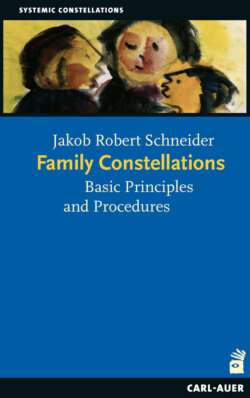Читать книгу Family Constellations - Jakob R Schneider - Страница 11
На сайте Литреса книга снята с продажи.
Analysis
ОглавлениеWe can, of course, analyse this constellation with hindsight. What had happened in this family?
The client’s mother had lost her father at a very early age when her parents separated. At first there was minimal contact with him, but after a while there was none, and then he died. She continued to feel a childlike love and longing for him. Some of these feelings were re-activated in her relationship to her fiancé, but there was a repetition of the earlier childhood situation when he left her. Still, she continued to keep her love and longing for him in her heart, just as for her father. Then, her son came along and took the place of her father and ex-fiancé, and she continued to love them in her son. For the client, that provided a tremendous closeness to his mother, but he felt this as a burden as well. In addition, he experienced his father as lacking in strength and too occupied with himself to free his son from his excessive closeness to his mother.
The client’s father was left in a kind of blind numbness and absence of feelings after the death of his mother, which is a reaction we often see in people who have lost their mothers when they were children. He was well taken care of later by his adoptive parents but, over time, the adoption led to a complete separation from his father in addition to the loss of his mother. He felt abandoned and alone, and closed off his feelings. If he let his love flow, he re-experienced his pain and longing for his mother again and felt drawn to follow her into death. This was his deep, justifiable fear.
The daughter in the family felt the pull towards death behind her father’s hidden feelings. She put all her energy into fighting against this pull and tried to keep her father alive by staying close to him and giving him what he had been denied with his mother. In doing so, she sacrificed part of her carefree childhood and her closeness to her own mother. In her late teens she had to be treated for depression and had a brief bout of anorexia, but recovered. At the time of this constellation, she had been married for two years and was very often ill.
The bonds of the two children with the fates of their parents also separated the sister and brother. Each one had a “task” but they had lost the feeling of simply being the two children of their parents. The actual relationship between the siblings was not problematic, but rather distant. The resolution that emerged in the constellation for the parents was a great relief for the children. They could now, retroactively, hold a mental image of their place as children. The grandparents were granted a place, and the family’s love could flow freely through the proper channels, according to the various fates of those concerned.
This explanation of the family dynamics is, of course, not a complete picture of the family’s reality. The family members seem to have unmet needs, even in the experience of the constellation itself. It is clearly not necessary to elucidate the dynamics of a constellation for a client with any explanations of this kind. Explanations have much more vitality when they are experienced indirectly through the movements of the representatives and the words that are spoken. In the evolving course of the constellation, one can feel immediately what is right and what isn’t, and the therapist can correct any prior assumptions according to the reactions of the representatives and the client. One need not delve into any aspects of the family dynamics except those that clearly provide relief. The greatest advantage of the constellation method is the focus on what is essential and experiential. Actual experience and the accompanying insight replace that kind of thinking and reflection that goes no further than the head.
When we look at a constellation like this one, we can imagine that the logical conclusion will be changes in the client’s relationship to women, his professional life, and of course his relationship to his parents, who are still alive and living together. Other questions may arise, however. In groups, participants often ask if the effects are really helpful to someone, beyond the experience of the constellation and, do representatives reliably reflect what happened in the client’s family? If that is so, how is it possible? What happens if there is no relevant information about a family’s history? Are those events in the family history really more influential than what we experience directly in growing up with our parents? I will return to these and other questions later.
